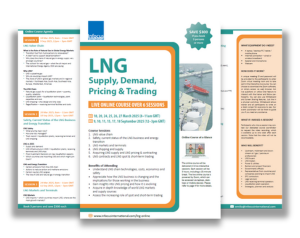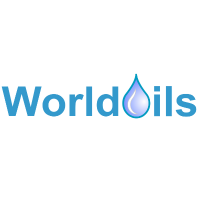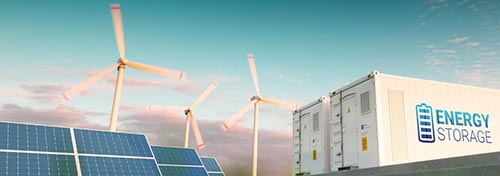LNG: Supply, Demand, Pricing and Trading (Online Course)
WHEN
Commences: 9 September 2025
WHERE
Live Online Course
Overview
The early 2020s have seen major changes in the global LNG business, responding to the impact of Covid19, the Ukraine war and energy transition. LNG and natural gas prices have swung from a low point of $2/MMBtu in 2020, when demand fell with the Covid crisis, to over $70/MMBtu in 2022, as Europe’s demand surged in the aftermath of Russia’s invasion of Ukraine. However, 2023 was a year of fewer shocks. Prices were more stable but around double the 2019 level. LNG supply and demand growth slowed to under 2% from 5% in 2021-2022. High prices and slowing economic growth affected demand in 2023 while the only addition to liquefaction capacity was the 3.8 mtpa train 3 at the Tangguh plant in Indonesia.
The outlook for growth in supply is much brighter with major new liquefaction projects in Qatar, USA, Canada and Russia scheduled to come on stream between 2024-2028, adding over 200 mtpa of liquefaction capacity to the 470 mtpa in operation at the end of 2023. There will be declines in output from some of the operating plants as reserves decline and older trains are taken offline but supply and demand is expected to increase from 402 mtpa in 2023 to 625 mtpa by 2030. Projects with a total capacity of over 400 mtpa are at the planning stage and developers of over 100 mtpa of capacity are targeting FID by the end of 2024. However, there is uncertainty over how many of these projects will be required to meet long-term demand as governments of the existing and prospective LNG importing countries target net-zero greenhouse gas emissions by 2050 or 2060. Developers argue that natural gas and LNG will be needed to help manage the transition to renewables while environmentalist see natural gas as just another fossil fuel whose use has to be reduced if targets to slow climate change are to be achieved. Some buyers and financiers have been reluctant to commit to supply from new LNG projects, which will be looking to produce LNG into the 2040s to remunerate the investment of billions of US dollars.
The online course will, over 6 sessions, discuss the issues facing the LNG business as it looks to meet the needs of consumers over period to 2050. It will focus on commercial issues, but technology and shipping will also be covered. It will consider the outlook for the business in terms of markets, sources of supply, pricing and trading and the response to energy transition. It is designed not only for newcomers to LNG but also those who want to refresh their knowledge or who have experience in one part of the business or one region and want to widen their knowledge.
Benefits of Attending
- Understand LNG chain technologies, costs, economics and safety
- Appreciate how the LNG business is changing and the implications for those working in the business
- Gain insights into LNG pricing and how it is evolving
- Acquire in depth knowledge of world LNG markets and supply sources
- Assess the increasing role of spot and short-term trading
Live Online Course – How It Works
The structure of our virtual learning program is designed to keep the same levels of engagement and networking as our on-site public courses. Course content is delivered through our easy-to-use online learning platform and is supplemented by case studies and practical exercises.
Like our classroom-based public courses, you will have live interaction with our course facilitators and other participants. Our live online courses are led by our experienced instructors, who will provide you with easily digestible content, using knowledge learned from many years in the industry, during scheduled times. Delegates will receive copies of the course materials electronically.
This course is scheduled to take place over 6 live online sessions using virtual learning technology.
Course Agenda
Session 1: 9 September 2025, 12pm – 3pm GMT
LNG Value Chain
- What is the Role of Natural Gas in Global Energy Markets
- Why LNG?
- The LNG Chain
Session 2: 10 September 2025, 12pm – 3pm GMT
Safety, Current Status of the LNG Business and Energy Transition
- LNG Safety
- LNG in 2025
- LNG and Energy Transition
Session 3: 11 September 2025, 12pm – 3pm GMT
LNG Markets and Terminals
- LNG Markets
- Floating Storage and Regas Units (FSRUs) and Floating Storage Units (FSUs)
- Accessing LNG Receiving Terminal Capacity
Session 4: 15 September 2025, 12pm – 3pm GMT
LNG Shipping and LNG Supply
- LNG Shipping
- LNG Supply
- Floating Liquefaction (FLNG)
Session 5: 17 September 2025, 12pm – 3pm GMT
Acquiring LNG Supply and LNG Pricing & Contracting
- Options for Acquiring LNG Supply
- LNG Pricing
- LNG Contracts
Session 6: 18 September 2025, 12pm – 3pm GMT
LNG Contracts and LNG Spot and Short-term Trading
- Sales and Purchase Agreements
- LNG Spot and Short-Term Trading
- Hedging, Risk Management and Derivatives
- The Future of LNG
- Course Review and Final Q&A
Training Methodology
The agenda will combine presented materials with plenty of opportunity for Q&A, interactive discussions, and the use of quantitative models to illustrate key learning points. Current market examples and data are utilised wherever helpful.

Pre-Course Questionnaire
We would like to customise the workshop based on your specific needs. Pre-Course Questionnaire will be sent prior to the workshop for analyse in advance and to be addressed during the course.

Course Certificate
Upon the successful completion of this course, you will receive a Certificate of Completion bearing the signatures from both the Course Director and the Course Organiser. This Certificate will testify your endeavour and serve towards your professional advancement.
Who Will Attend
- Upstream, midstream and downstream oil / gas / petroleum professionals
- LNG buyers
- LNG traders
- Power & utilities
- Bankers and project financiers
- Governments officials
- Representatives from countries and companies planning to import LNG
- EPC contractors
- Legal advisers
- LNG receiving terminal operators
- Liquefaction plant operators
- Strategists, planners and analysts
You Might Also Be Interested In
Electric Vehicle (EV) Charging & Power Grid (Online Course)
The essential guide to opportunity and risk within emerging EV charging value chains
Dates: 6, 7, 8 May 2025
Project Finance & Project Financial Modelling (Online Course)
Project finance and financial modelling best practices with practical case studies
Option 1: 13, 14, 15, 20, 21, 22, 27, 28 May 2025
Option 1: 5, 6, 10, 12, 13, 18, 19, 20 November 2025
Energy Storage (Online Course)
A business-focused assessment of energy storage opportunities, competing solutions and project delivery essentials
Option 1: 16, 17, 18, 20 June 2025
Option 2: 17, 18, 19, 20 November 2025
EPC Contracts for Energy Industry (Online Course)
A comprehensive analysis of EPC contracts and of the key considerations in projects and disputes where such contracts are used
Dates: 1, 2, 3, 8, 9 July 2025
Green Hydrogen Projects, Economics & Finance (Online Course)
Developing green hydrogen projects by seamlessly integrating core technological and economic elements
Dates: 26, 28 August, 2, 3, 4 September 2025
Public-Private Partnerships (Online Course)
Mastering PPP project analysis, financing, contracts & transaction management techniques






























